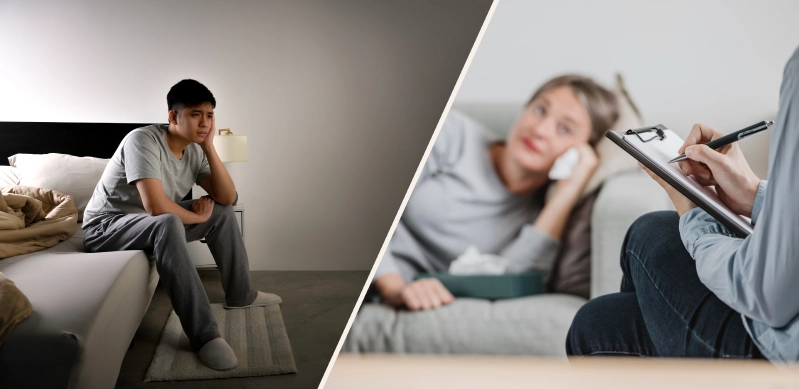
Esketamine FDA Approval: A Ray of Hope in Mental Health Treatment
Esketamine FDA Approval: A Ray of Hope in Mental Health Treatment The recent FDA approval of Esketamine stands as a beacon of hope, promising a

Dealing with depressive episodes can be challenging, especially when it comes to understanding their duration and causes. Depressive episodes, commonly associated with major depressive disorder, vary in length from person to person, with some enduring brief spells while others face longer bouts of depression.
The causes are multifaceted, involving genetic, biological, environmental, and psychological factors such as genetics, brain chemistry imbalances, adverse childhood experiences, stressful life events, and lack of social support.
Understanding the basics of how long depressive episodes last and why they occur is crucial for effective management and treatment.
Depressive episodes are periods characterized by a pervasive and persistent low mood, often accompanied by a range of other symptoms that significantly impact daily functioning and quality of life. In essence, they represent a core feature of various depressive disorders, including major depressive disorder (MDD), persistent depressive disorder (PDD), and bipolar disorder.
Major depressive disorder, the most common type, entails experiencing one or more depressive episodes interspersed with periods of normal mood. Persistent depressive disorder, on the other hand, involves chronic depressive symptoms lasting for at least two years, albeit with fluctuations in severity.
Additionally, depressive episodes can occur within the context of bipolar disorder, alternating with periods of elevated mood known as manic or hypomanic episodes. Understanding the nuances of these different types of depressive episodes is vital for accurate diagnosis and tailored treatment approaches.
Depressive episodes can vary significantly in duration, with some individuals experiencing relatively short episodes lasting a few weeks, while others endure prolonged periods of depression spanning months or even years. Several factors influence the length of depressive episodes, impacting both their onset and resolution. These factors include:
Severity of the episode: The intensity of depressive symptoms can influence how long an episode lasts, with more severe episodes often lasting longer.
Previous episodes: Individuals who have experienced depressive episodes in the past may be more prone to recurrent episodes or longer durations of depression.
Treatment adherence: Consistent adherence to treatment, including medication and therapy, can contribute to shorter durations of depressive episodes.
Support network: Strong social support from family and friends can aid in coping with depressive symptoms and may shorten the duration of episodes.
Co-occurring conditions: The presence of other mental health conditions or medical illnesses can complicate depressive episodes and potentially prolong their duration.
Stressful life events: Significant life stressors, such as the loss of a loved one or financial difficulties, can trigger or exacerbate depressive episodes, leading to longer durations of depression.
Biological factors: Individual differences in brain chemistry and genetic predispositions may impact the duration of depressive episodes.
Coping mechanisms: Effective coping strategies, such as engaging in regular exercise or practicing mindfulness, can help manage depressive symptoms and potentially
The duration of depressive episodes can vary widely among individuals, making it challenging to pinpoint an exact average duration. According to the American Psychiatric Association, depression is recognized as a prevalent and significant medical condition that profoundly impacts an individual’s emotions, cognition, and behavior.
While the duration of depressive episodes can fluctuate, studies suggest that the mean duration typically falls within the range of six to eight months. However, it’s essential to acknowledge the considerable variability among individuals, as some may experience shorter episodes lasting a few weeks, while others endure longer bouts of depression spanning years.
Understanding these statistics and the inherent variability is crucial for individuals and healthcare professionals alike in navigating the complexities of depressive disorders and facilitating effective treatment interventions.
Short-term depressive episodes, typically lasting from a few weeks to a few months, are characterized by intense feelings of sadness, hopelessness, and disinterest in activities that were once enjoyed. While the duration of these episodes may be relatively brief compared to longer-term depressive episodes, they can still have a significant impact on an individual’s well-being.
Common triggers for short-term depressive episodes may include stressful life events such as job loss, relationship difficulties, or financial strain.
Duration range: Typically lasting from a few weeks to a few months
Common triggers: Stressful life events such as job loss, relationship difficulties, or financial strain
Coping mechanisms: Engaging in regular exercise, practicing mindfulness or relaxation techniques, maintaining a healthy routine, seeking support from loved ones or mental health professionals
Long-term depressive episodes are characteristic of a condition called Persistent Depressive Disorder (PDD), also known as dysthymia.
Duration
The defining feature of PDD is a depressed mood that lasts for at least two years for adults (one year for children and adolescents) most of the day, more days than not. While major depressive episodes can also last for a long time, PDD is distinguished by the chronicity of low-grade depression.
Impact on daily life
While the symptoms of PDD are generally milder than major depression, they can still have a significant impact on a person’s daily life. People with PDD may experience:
These symptoms can make it difficult to hold a job, maintain relationships, and enjoy life.
Seeking professional help
If you are experiencing symptoms of PDD, it is important to seek professional help. A mental health professional can diagnose PDD and develop a treatment plan. Treatment for PDD typically includes psychotherapy (talk therapy) and medication. With treatment, most people with PDD can improve their symptoms and live full and productive lives.
Triggers play a significant role in the onset and exacerbation of depressive episodes, but managing these triggers effectively can help individuals cope and prevent the escalation of symptoms. Implementing self-care strategies, exploring therapy options such as Cognitive Behavioral Therapy (CBT) and Interpersonal Therapy (IPT), and considering medication when necessary are crucial steps in managing depressive episodes.
Consult with a psychiatrist or healthcare provider to determine the most appropriate medication and dosage based on individual symptoms, medical history, and potential side effects.
Understanding the duration, triggers, and management strategies for depressive episodes is crucial for individuals navigating the complexities of depression. Depressive episodes can vary widely in duration and severity, impacting various aspects of daily life. By fostering awareness, resilience, and access to professional help, individuals can navigate depressive episodes with greater understanding and hope for a brighter future.

Esketamine FDA Approval: A Ray of Hope in Mental Health Treatment The recent FDA approval of Esketamine stands as a beacon of hope, promising a

Why Does Life Not Feel Real? A Comprehensive Guide Sometimes, life can feel like a dream. We go through our daily routines, but they all

Psychiatric Medication Management: A Guide to Finding Your Balance Psychiatric Medication Management refers to the comprehensive and personalized approach to using medications for the treatment
